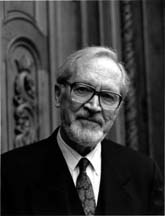Spring/Summer 2008, Volume 24.3
In Memoriam

William Mulder, 1915-2008
Utah lost one of its great twentieth-century intellectuals earlier this year. When Dr. William Mulder closed his eyes on 12 March 2008, he also closed a chapter in the intellectual history of a state that profited immensely from his leadership. Born in Haarlem, Holland, in 1915, he immigrated to the United States with his parents in 1920, first to New Jersey and six years later to Salt Lake City. He graduated from the University of Utah in 1940 and was elected Phi Kappa Phi and Phi Beta Kappa. Following a master’s degree in English in 1947, Mulder earned a Ph.D. from Harvard University in American Civilization and returned to a long and distinguished teaching career in the University of Utah’s English Department.
In the 1950s, Mulder became part of a group of LDS intellectuals nicknamed the "Swearing Elders," who met regularly on campus to discuss Mormon issues. Later he drifted from the church, noting that "the trouble with various theologies is that they build walls around things that should be open." Mulder’s teaching was similarly wall-breaking, as he bridged disciplines and broke down boundaries between literature, history, and cultural studies. In the early 1970s he introduced then-groundbreaking courses in African American literature, American Indian literature, and ethnic minority literature.
Paralleling his teaching, Dr. Mulder was a forward-looking thinker, who sought to connect the world in the decades before instant electronic connectivity. Long before "globalization" became fashionable, he sought to internationalize Utah’s mindset by reaching out to other cultures. Among his many cross-cultural achievements, Dr. Mulder founded the University of Utah’s Center for International Studies (which became the Middle East Center); he developed the American Studies Research Center and library in Hyderabad, India; he lectured for the U.S. Information Service in India and visited universities in Japan for the Asia Foundation to assess programs and library holdings; and he served on the advisory board of the National Council on International Exchange of Scholars for Fulbright awards in American Studies. Dr. Mulder’s former colleague and friend, Professor Emeritus Ed Lueders, noted that "Bill and his wife Helen forged international relationships, particularly with India, that continue today thanks to Bill’s acumen and attention to others." Echoing this sentiment, Dr. Candadai Seshachari, Professor Emeritus of Weber State University and another long-time friend, commented that "when I first met Bill in 1956 in Hyderabad, I was amazed how easily he had slipped into things Indian—Indian ways of salutation, Indian ways of doing things, into the Indianness of being. He was one with Indian life and culture. Walls of separation did not exist for him. He joked that perhaps in a previous incarnation he might have been from Hyderabad."
Bill was, indeed, the rarest of gentleman scholars, a mentor, bibliophile, historian and global citizen who embodied the principles of the Humanities in the profoundest sense. As the longtime editor of the Western Humanities Review and the recipient of the Governor’s Award in the Humanities from the Utah Humanities Council, he served for many years on the advisory board of the former Weber Studies and gave generously of his time and knowledge. True to his intellectual grandeur and modesty, he never drew attention to his own greatness. Thank you, Bill.
